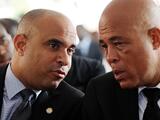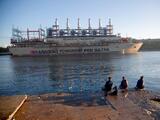Venezuelan oil: a lifeline, or Maduro’s Achilles heel?
Lee este artículo en español.

After the failure of a humanitarian aid effort last weekend, the international campaign to oust Venezuela’s de facto President, Nicolas Maduro, appears destined for a long drawn out war of attrition.
Focus is shifting now to a slow and steady strangulation of Venezuela’s oil-rich economy, with mounting U.S. sanctions against the state-run petroleum company, PDVSA, a former cash cow that some now see as Maduro’s Achilles heel. But, experts warn that sanctions are never airtight, and the oil industry is so fluid it may be hard to totally cut off buyers of Venezuelan oil.
"Oil is a commodity and at the right price people will buy it. It’s like stolen property; there's always going to be someone willing to make a buck," said Russ Dallen, managing director of Caracas Capital, a Venezuela-based boutique investment bank, who closely tracks the oil industry.
Under the sanctions announced by the Trump administration in late January, the U.S. has already ratcheted up the pressure on PDVSA, ordering that all U.S. payments for oil imports from Venezuela be diverted into a “locked” escrow account that cannot be accessed by the Maduro regime. Making the announcement, U.S. National Security Council Advisor John Bolton said $7 billion in assets were immediately blocked and he estimated that Maduro would lose $11 billion in export proceeds over the next year.
U.S. officials accused the Maduro regime of “looting” PDVSA to line their own pockets and buy the loyalty of the military.
“The main goal for the U.S. seems to be to dry up the supply of cash to the Maduro regime,” said Eric Smith, an oil industry expert and director of the Energy Institute at Tulane
University in New Orleans.
Considered a dictator and usurper by his enemies, Maduro has rejected diplomatic efforts to negotiate his leaving office. And despite some, mostly low level, desertions by Venezuelan security forces, the armed forces have remained loyal to him.
Although the Trump administration has said all options are on the table, including military intervention, most governments in the region appear reluctant to go down that route, unless extreme circumstances require it, such as an attack on a foreign embassy in Caracas by Maduro’s forces, or a Tiananmen Square style bloodbath.
Patience required
In recognition of Maduro’s hold on power, diplomats are now urging patience. "Is it a transition that is going to be immediate, surely not … it's an incremental job,” Gonzalo Koncke, the chief of staff to OAS Secretary General Luis Almagro told EFE, the Spanish news agency, this week.
That leaves sanctions as the main tool.
While they are notoriously ineffective, Venezuela is more vulnerable to sanctions than most countries as oil accounts for 92 percent of its economy. About 50 percent of the oil it produces goes straight into debt payments, mostly to China. The other half is sold with almost 90 percent going to U.S. refineries in Texas and Louisiana.
“The United States controls 80-82 percent of the Venezuelan inflow of cash,” said Fernando Cutz, who worked in the White House National Security Council under presidents Obama and Trump before leaving the government last year. He estimated that while Venezuela can likely find new markets for its oil, cutting off shipments to the United States would probably “shut off 50 percent of their economy.”
Cut off from U.S. oil payments, Maduro has already begun to look for alternative markets, including India, the world’s second most populated country with 1.4 billion people and fast-growing fuel market which has a huge appetite for fuel as its population moves from bicycles to motorbikes and cars. “The Indians love Venezuelan oil,” said Dallen. “It’s very heavy, like tar, they can also turn it into asphalt and use it to make roads.”
In the last month, U.S. oil imports from Venezuela have fallen to historic lows, down last week almost 70 percent from the start of the year, according to the U.S. Energy Information Administration (EIA). Venezuela shipped an average of 580,000 barrels per day of crude oil and petroleum products to the United States in 2018. Last week it dropped to 208,000 barrels.
The U.S. sanctions also bar the use of U.S. dollars in any PDVSA transactions. However, the sanctions cannot prevent barter trades or non-cash deals for petroleum with PDVSA or the use of other currencies such as euros.
Debt and cash flow
To beat the sanctions Maduro faces several issues, including how the crude gets to new destinations and the cost of doing that, experts say. “The issue is going to be a delay in cash flow and a lower price per barrel versus deliveries to the U.S.,” said Jorge Piñon, a former oil executive and director of the Latin America and Caribbean Energy Program at the University of Texas at Austin.
Oil shipments to China produce no cash as Venezuela is still paying down $65 billion in loans, with $20 billion still outstanding. Venezuela also owes $2.3 billion to Russia, which is being paid with oil.
Even if new markets are found, the cost of shipping half way around the world instead of the relatively short trip across the Caribbean to the United States, will reduce profits. Add to that the limited market for Venezuelan crude, known as ‘orimulsion’ which is heavy with sulphur and requires special refining capacity, and the value falls lower.
But U.S. officials recognize that the sanctions have holes, especially considering that 50 United Nations member countries, including Russia, China, Turkey and Iran have not recognized Venezuela’s new, U.S.-backed interim president Juan Guaidó, and have vowed to continue supporting Maduro. At a meeting on Monday of foreign leaders of the so-called Lima Group, U.S. Vice President Mike Pence called on all its 12 members, including Brazil, Argentina, Mexico, and Colombia, to immediately freeze the assets of PDVSA.
“It’s time to do more,” Pence said. “In the days ahead, the United States will announce even stronger sanctions on the regime’s corrupt financial networks. We will find every last dollar they have stolen and return that money to the Venezuelan people,” he added.
U.S. Senator Marco Rubio told Univision he’s hopeful that more countries who recognized Guaidó will cut off trade with Maduro for Venezuelan oil. "International pressure continues to mount against Maduro and his cronies, making it harder for them to hold on to power," he said. “We will continue to urge all nations to support interim President Juan Guaido and the Venezuelan people’s efforts to restore democracy and constitutional order,” he added.
Incompetence, plunging production
Ironically, Washington’s best ally in crippling Maduro’s access to oil revenue has been Maduro himself, due to mismanagement of PDVSA by the socialist government. Venezuela sits atop the world’s largest proven oil reserves of more than 300 billion barrels, but its crude oil production has plunged by 70 percent in the last two decades, from three million barrels per day in 1998 to barely one million barrels per day in January, according to the monthly report of OPEC, the organization of oil exporting nations.
The current head of PDVSA, General Manuel Quevedo is a career military officer with no oil industry experience. “Quevedo has done the work of our sanctions by himself because of his incompetence,” said Dallen. “They have killed the golden goose themselves,” he added.
As a result, nearly 20 years after the late Hugo Chavez launched his “Bolivarian revolution,” Venezuela is in economic freefall, food and medicines are scarce and unaffordable, hyperinflation is running at an annual rate of 800,000 percent and roughly three million Venezuelans have fled the country.
Anaconda squeeze
Even so, experts point out that sanctions tend to take years to work, or fail entirely, when they don’t have unanimous backing around the world, such as Cuba’s communist government which has survived more than 50 years under a U.S. embargo.
“If Maduro is able to gain new lifelines then there’s no telling how long he can hold out,” said Eric Farnsworth, a Latin America expert at the Council of the Americas. “What can be anticipated, however, is that there will be further intensified pressure on the regime, which will squeeze it like the large anacondas that inhabit Venezuelan waters.”
To cut off oil to places like India, the U.S. may have to take unpopular steps, including secondary sanctions against other foreign oil companies. “The message would be: you touch the oil, you’re dead, it’s the fruit of the poisoned tree,” said former U.S. ambassador John Feeley, a Univision foreign affairs analyst.
Trump’s national security chief, Bolton, has already hinted as much in a tweet warning bankers and oil brokers not to trade in Venezuela’s “stolen” commodities, such as oil and gold.
Bolton tweet:
Unlike the U.S. sanctions on Iran, the U.S. hasn’t banned the use of banking and shipping to trade Venezuelan oil elsewhere in the world, or by non-American companies. For example, Russia’s Kremlin-controlled oil company Rosneft owns the Vadinar refinery in India which was bought in 2017 to handle Venezuela’s heavy crude. Another Indian company, Reliance Industries, is also a major PDVSA client.
Less than two weeks after the U.S. sanctions were announced, PDVSA’s boss Gen Quevedo, traveled to India saying Venezuela wanted to double the oil sales there. Venezuela is hopin to create a trade bloc consisting of China, India and Russia to help it execute oil payments in currencies other than the dollar, according to Quevedo. “We all can build one economy and that economy does not necessarily have to be within the dollar economy,” Quevedo told reporters in India, referring to China, Russia and India.
The Trump administration continues to sanction individuals in the Maduro regime, freezing assets, banning all financial dealings with them, and banning them from travel to the United States.
Naval blockade?
Another option would be a naval blockade of Venezuela, a rare step the U.S. has not used in this hemisphere since the Cuban missile crisis in 1962. “We had U.S. ships stop Russian freighters with missiles on board. That worked pretty well,” said Smith, the Tulane energy expert. “I do think the U.S. is fully capable of setting up an effective embargo. However, it could require the use of naval forces to interdict suspect oil tankers entering or leaving Venezuelan ports,” said Smith.
However, that was unlikely to “go well with neighbors,” he said.



